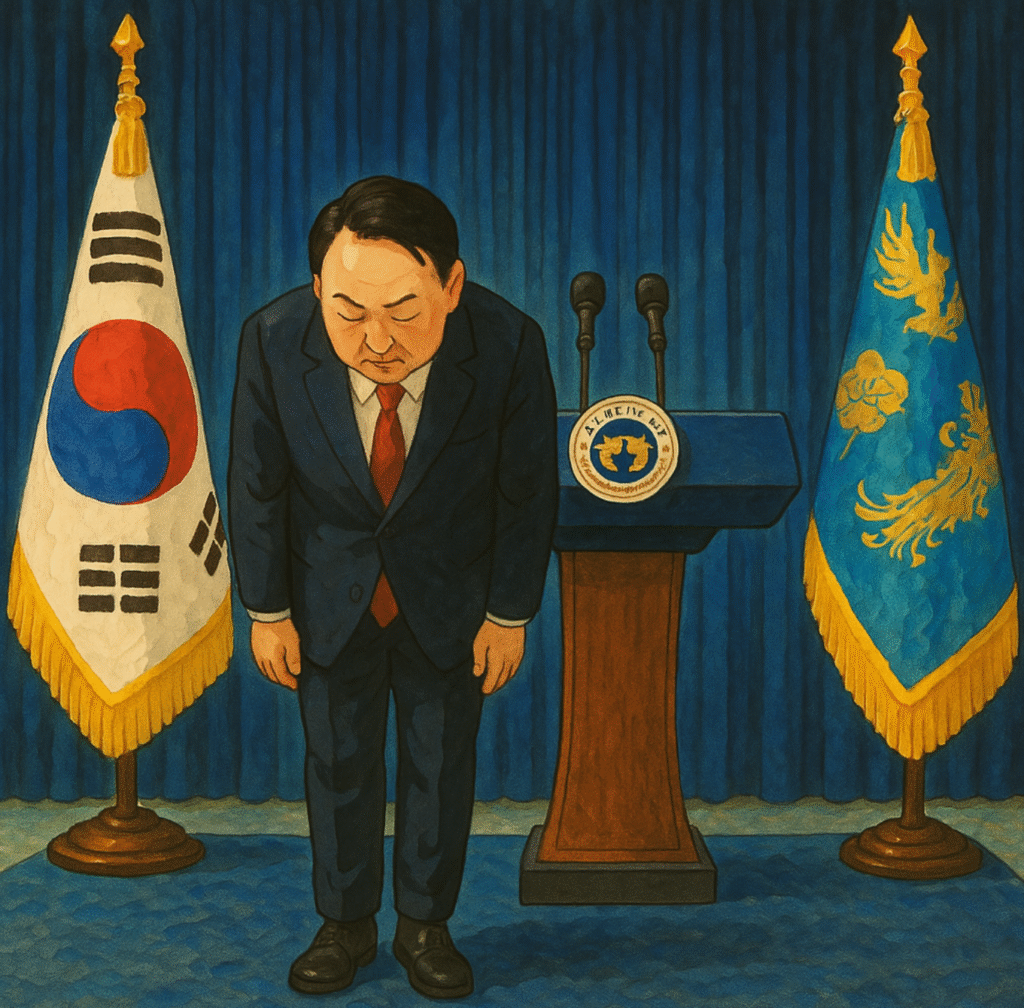
The unanimous decision ends a constitutional crisis that began with his short-lived martial law declaration in December.
SEOUL, South Korea — South Korea’s Constitutional Court unanimously voted on Friday to remove President Yoon Seok-yeol from office, bringing to a dramatic close a political crisis that has gripped the nation for more than four months and tested the resilience of its democratic institutions.
The decision, delivered at 11 a.m. in a packed courtroom, makes Mr. Yoon only the second South Korean president to be successfully impeached and removed from power. It came 123 days after his stunning declaration of martial law on Dec. 3 — a move that lasted just six hours but set off the chain of events that ultimately ended his presidency.
“The respondent, President Yoon Seok-yeol, is hereby removed from office,” the chief justice declared as crowds of protesters and supporters gathered outside the court building in Seoul.
The ruling immediately strips Mr. Yoon of the legal protections afforded to a sitting president, opening the door for prosecutors to pursue criminal charges against him. It also triggers a 60-day countdown for South Korea to elect a new president, with the acting president, Han Duck-soo, continuing to lead the government in the interim.
For South Korea, a key U.S. ally in Northeast Asia, the decision resolves months of political turmoil that had raised concerns about stability in a region already grappling with North Korea’s nuclear threats and rising tensions with China.
A Crisis Born of Martial Law
Mr. Yoon’s downfall began with what many viewed as an extraordinary miscalculation. On the night of Dec. 3, he declared martial law, citing threats from “anti-state forces” and accusing opposition lawmakers of sympathizing with North Korea. The declaration banned political activities, placed media under military control and suspended the functions of the National Assembly.
But within hours, lawmakers had fought their way past military cordons to vote unanimously to overturn the martial law decree. Facing massive protests and defections within his own party, Mr. Yoon was forced to lift the declaration before dawn.
The episode shocked South Koreans, many of whom saw it as an attempt to turn back the clock to the country’s authoritarian past. Opposition parties immediately began impeachment proceedings, arguing that Mr. Yoon had violated the Constitution and abused his presidential powers.
On Dec. 14, the National Assembly voted to impeach Mr. Yoon, with some members of his own conservative People Power Party joining the opposition. Mr. Yoon was immediately suspended from his duties, though he retained his title and legal protections while the Constitutional Court deliberated.
Legal Reckoning Ahead
With Friday’s ruling, Mr. Yoon loses the presidential immunity that has shielded him from prosecution. Under South Korean law, a sitting president can be indicted only for insurrection or treason, but a former president enjoys no such protection.
Prosecutors have already been building cases against Mr. Yoon on multiple fronts. Beyond the martial law declaration, he faces potential charges related to alleged election interference, abuse of authority and obstruction of justice for trying to block the execution of arrest warrants against his associates.
The Seoul Central District Prosecutors’ Office had previously sought to arrest Mr. Yoon in connection with the martial law case, but was blocked by his presidential security detail. Legal experts say prosecutors are likely to renew their efforts now that he has been removed from office.
Mr. Yoon’s legal team has consistently denied all allegations, characterizing the impeachment as a politically motivated “witch hunt” by the opposition. In a statement Friday, his lawyers said they would continue to fight the charges, arguing that the martial law declaration was a legitimate exercise of presidential authority in the face of what they called legislative obstruction.
Financial Markets Celebrate Clarity
South Korean financial markets surged on the news, with investors interpreting the court’s decision as an end to months of political uncertainty.
The Korean won jumped sharply against the dollar, rising 31 won to trade at 1,435 per dollar shortly after the ruling was announced. The currency had already been strengthening in recent days due to broader dollar weakness, but the court decision accelerated the gains as investors bet that political stability would return.
“The market has been waiting for this clarity,” said Kim Seung-hwan, an analyst at Samsung Securities in Seoul. “While there will still be a transition period, removing this overhang is positive for Korean assets.”
The benchmark Kospi stock index also rose, with shares of major South Korean conglomerates like Samsung and LG posting gains on expectations that the political crisis would no longer distract from economic policy making.
A Democracy’s Test
The impeachment saga has been closely watched as a test of South Korea’s democratic institutions, which emerged from decades of military rule only in the late 1980s. Many observers saw Mr. Yoon’s martial law declaration as the most serious threat to the country’s democracy since that transition.
The swift rejection of martial law by lawmakers and the subsequent impeachment proceedings have been viewed by many South Koreans as proof that their democratic system can withstand authoritarian challenges.
“This shows that our democracy is stronger than any one person,” said Park Jin-wook, a political science professor at Seoul National University. “The institutions held.”
The case also drew parallels to the 2017 impeachment of Park Geun-hye, the conservative president who was removed from office over a corruption scandal. Ms. Park was later sentenced to prison, though she was eventually pardoned.
Mr. Yoon’s supporters, while diminished in number, have denounced the impeachment as an overreach by opposition parties seeking to overturn the results of the 2022 election. Some gathered outside the Constitutional Court on Friday chanting slogans supporting the former president.
What’s Next
With Mr. Yoon’s removal now final, South Korea must hold a presidential election within 60 days. Early polling suggests that opposition parties, which have been riding high in public approval ratings since the martial law crisis began, are likely to regain control of the presidency.
The leading contenders include Lee Jae-myung, the head of the main opposition Democratic Party, who narrowly lost to Mr. Yoon in 2022, and several other politicians from both progressive and conservative camps.
The new president will inherit significant challenges, including managing relations with North Korea, which has grown increasingly belligerent in recent years, and navigating South Korea’s complex relationship with the United States and China.
For Mr. Yoon, the immediate concern is likely to be his legal future. The 64-year-old former prosecutor, who built his career fighting corruption before entering politics, now faces the prospect of becoming the first former South Korean president to stand trial while in office.
As he prepares to leave the presidential residence in Seoul’s Hannam district, possibly as early as this weekend, Mr. Yoon’s presidency will be remembered as one of the shortest and most tumultuous in South Korean history — a cautionary tale about the fragility of democratic norms and the swift consequences that can follow when leaders overstep constitutional boundaries.



![[BLT칼럼] 아이온큐가 특허로 '기술 신뢰도'를 쌓은 법 : 양자컴퓨팅 시대, IP 전략 제시 8ee48ae3a3a11](https://platum.kr/wp-content/uploads/2025/10/8ee48ae3a3a11-150x150.png)



Leave a Comment